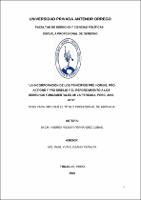| dc.contributor.advisor | Lozano Peralta, Raúl Yván | |
| dc.contributor.author | Fernández Cubas, Andrea Vicmar | |
| dc.creator | Fernández Cubas, Andrea Vicmar | |
| dc.date.accessioned | 2021-01-07T15:43:08Z | |
| dc.date.available | 2021-01-07T15:43:08Z | |
| dc.date.issued | 2021 | |
| dc.identifier.uri | https://hdl.handle.net/20.500.12759/7039 | |
| dc.description.abstract | La investigación tuvo como objetivo general el determinar si es conveniente jurídicamente
incorporar los principios pro homine, pro actione y favor debilis para un reforzamiento de
los derechos fundamentales.
La metodología de investigación se enmarco en un diseño descriptivo propositivo, en donde
se utilizaron los métodos exegético y hermenéutico jurídico, los instrumentos de acopio de
datos fueron el fichaje para datos cualitativos o doctrinarios para el marco teórico; y el
cuestionario de expertos como datos de campo para obtener información sobre las variables
de estudio.
Los resultados de la investigación a nivel doctrinario y legislativo se obtuvo que los derechos
fundamentales tienen su cimiento en la dignidad humana y poseen una dimensión subjetiva
referida a las facultades reconocidas por la constitución y otra objetiva que se expande a los
ámbitos de la vida estatal y social; que los procesos constitucionales se orientan a buscar la
tutela de los derechos constitucionales y la defensa de la posición jurídica de la Constitución;
y que está regulado en instrumentos internacionales como el Pacto Internacional de Derechos
Civiles y Políticos, la Convención Americana sobre Derechos Humanos y en Constituciones
como Venezuela, Ecuador, México, república dominicana.
La conclusión principal es que, si sería conveniente jurídicamente la incorporación del
principio pro homine, pro actione y favor debilis para un mejor reforzamiento de los
derechos fundamentales, porque dotaría de justicia al ordenamiento jurídico y a los
justiciables, por lo que se recomienda la modificación del artículo V del título preliminar del
código procesal constitucional para incluirlos como criterios de interpretación de los
derechos constitucionales. | es_PE |
| dc.description.abstract | The general objective of this thesis report was to determine whether it is legally convenient
to incorporate the pro homine, pro actione and favor debilis principles for a reinforcement
of fundamental rights.
In the information gathering stage for the elaboration of the thematic dispersion of the
chapters of the theoretical framework, the sources of consultation were used, such as books,
legal journals, national and comparative legislation, jurisprudence, using the information
sheets as an instrument for gathering information. registration and research.
Regarding the results of the research developed in the chapters of the theoretical framework,
it was found that fundamental rights have their foundation in human dignity and have a
double legal nature, a subjective dimension referring to the faculties recognized by the
constitution and an objective one that it expands to all areas of state and social life; that the
constitutional processes are aimed at seeking the protection of constitutional rights and
defending the legal position of the Constitution and are grouped into three types of processes,
rights protection, regulatory control and competence conflict; it is regulated in international
instruments such as the International Covenant on Civil and Political Rights, the Convention
on the Rights of the Child, the American Convention on Human Rights and in Constitutions
such as Venezuela, Ecuador, Mexico, the Dominican Republic.
The main conclusion is that, if it would be legally convenient to incorporate the pro homine
principle, pro actione and favor debilis for a better reinforcement of fundamental rights,
because it would provide justice to the legal system and to those subject to justice, so that
recommends the modification of article V of the preliminary title of the constitutional
procedural code to include them as criteria of interpretation of constitutional rights. | en_US |
| dc.description.uri | Tesis | es_PE |
| dc.format | application/pdf | es_PE |
| dc.language.iso | spa | es_PE |
| dc.publisher | Universidad Privada Antenor Orrego | es_PE |
| dc.relation.ispartofseries | T_DERE_512 | |
| dc.rights | info:eu-repo/semantics/openAccess | es_PE |
| dc.source | Universidad Privada Antenor Orrego | es_PE |
| dc.source | Repositorio institucional - UPAO | es_PE |
| dc.subject | Principio Pro Homine | es_PE |
| dc.subject | Principio Favor Debilis | es_PE |
| dc.title | La incorporación de los principios pro homine, pro actione y pro debilis y el reforzamiento a los derechos fundamentales de la persona, Perú, 2018 - 2019 | es_PE |
| dc.type | info:eu-repo/semantics/bachelorThesis | es_PE |
| thesis.degree.grantor | Universidad Privada Antenor Orrego. Facultad de Derecho y Ciencias Políticas | es_PE |
| thesis.degree.name | Abogado | es_PE |
| thesis.degree.discipline | Derecho | es_PE |
| dc.subject.ocde | http://purl.org/pe-repo/ocde/ford#5.05.01 | es_PE |
| renati.advisor.orcid | https://orcid.org/0000-0002-7043-1848 | es_PE |
| renati.author.dni | 72072299 | |
| renati.advisor.dni | 40079448 | |
| renati.type | http://purl.org/pe-repo/renati/type#tesis | es_PE |
| renati.level | http://purl.org/pe-repo/renati/nivel#tituloProfesional | es_PE |
| renati.discipline | 421016 | es_PE |
| renati.juror | Estrada Diaz, Juan Jose | |
| renati.juror | Diaz Cabrera, Melissa Fiorella | |
| renati.juror | Palacios Bran, Roberto Alejandro | |
| dc.publisher.country | PE | es_PE |

